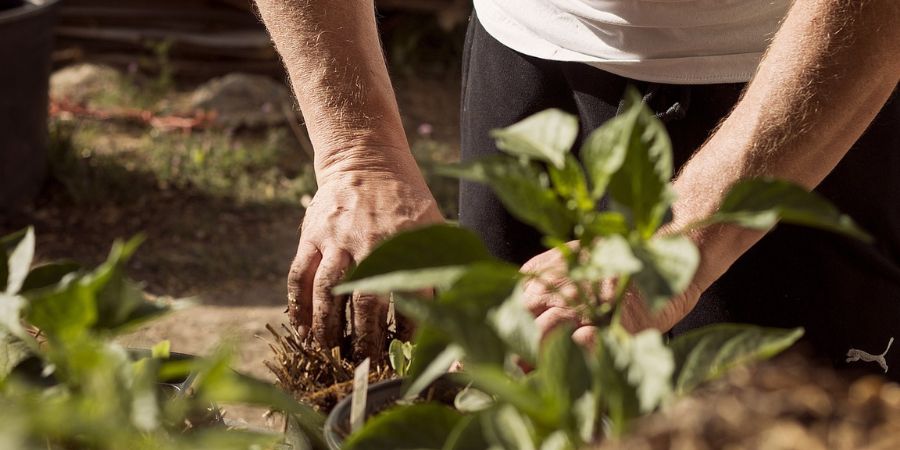Pest Problems
Solution: Integrated Pest Management (IPM)
Pests like aphids, slugs, and caterpillars can wreak havoc on your plants. Here’s how to manage them effectively:
- Identification: Properly identify the pests to choose the right control method.
- Natural Predators: Introduce beneficial insects like ladybugs and predatory beetles to control pest populations.
- Insecticides: Use insecticides from your local garden center; neem oil or insecticidal soap also works for severe infestations.
- Physical Barriers: Install barriers like row covers or copper tape to deter pests.
Weed Invasion
Solution: Preventative Measures and Manual Removal
Weeds compete with your plants for nutrients, water, and light. Control them with these strategies:
- Mulching: Apply mulch around your plants to suppress weed growth and retain soil moisture.
- Manual Weeding: Regularly pull weeds by hand or use a hoe to remove them from your garden beds.
- Weed Barriers: Use landscape fabric under your mulch to provide an extra layer of weed prevention.
Soil Issues
Solution: Soil Testing and Amendments
Healthy soil is the foundation of a thriving garden. Address common soil problems as follows:
- Soil Testing: Test your soil’s pH and nutrient levels.
- Amendments: Add organic matter such as compost or well-rotted manure to improve soil structure and fertility. Applewood Nursery & Landscape Supply offers a few different options for compost.
- pH Adjustment: Use lime to raise soil pH or sulfur to lower it, based on your soil test results.
Visit Applewood Nursery & Landscape Supply, Your One-Stop Landscape Shop!
Nutrient Deficiencies
Solution: Proper Fertilization
Nutrient deficiencies can lead to poor plant growth and yield. Identify and correct them with these steps:
- Symptoms: Look for signs like yellowing leaves (nitrogen deficiency) or purpling of leaves (phosphorus deficiency).
- Balanced Fertilizers: Use balanced, slow-release fertilizers to provide a steady supply of nutrients.
- Specific Supplements: Apply specific nutrients as needed, such as iron chelates for iron deficiency.
Watering Problems
Solution: Efficient Watering Practices
Both overwatering and underwatering can stress your plants. Achieve optimal watering with these tips:
- Consistent Schedule: Water your plants consistently, early in the morning or late in the afternoon.
- Deep Watering: Water deeply to encourage root growth, ensuring water reaches the root zone.
- Drip Irrigation: Use drip irrigation systems to deliver water directly to the roots, reducing water waste.
Plant Diseases
Solution: Prevention and Treatment
Fungal and bacterial diseases can spread quickly and devastate your garden. Manage them effectively:
- Proper Spacing: Space plants appropriately to ensure good air circulation and reduce humidity.
- Sanitation: Remove and dispose of diseased plant material promptly.
- Fungicides: Apply organic fungicides like copper sulfate for fungal infections.
- Crop Rotation: Rotate crops annually to prevent the buildup of soil-borne diseases.
Climate Challenges
Solution: Adaptation and Protection
Extreme weather conditions can stress plants. Protect your garden from climate-related issues:
- Frost Protection: Use frost blankets or cloches to protect plants from late spring or early fall frosts.
- Shade Cloth: Install shade cloths to protect plants from intense summer heat.
- Wind Barriers: Use windbreaks or plant hedges to shield your garden from strong winds.
Poor Pollination
Solution: Attracting Pollinators
Lack of pollination can result in poor fruit and seed set. Encourage pollinators in your garden:
- Pollinator-Friendly Plants: Plant a variety of flowers that bloom throughout the growing season to attract bees, butterflies, and other pollinators.
- Avoid Pesticides: Minimize the use of pesticides that can harm beneficial insects.
- Provide Habitat: Create habitats like bee hotels or water sources to support pollinators.
By addressing these common gardening problems with the right solutions, you can enjoy a lush, healthy garden all season long. For more personalized advice and high-quality gardening supplies, visit Applewood Nursery & Landscape Supply. Our experts are always here to help you achieve gardening success!

